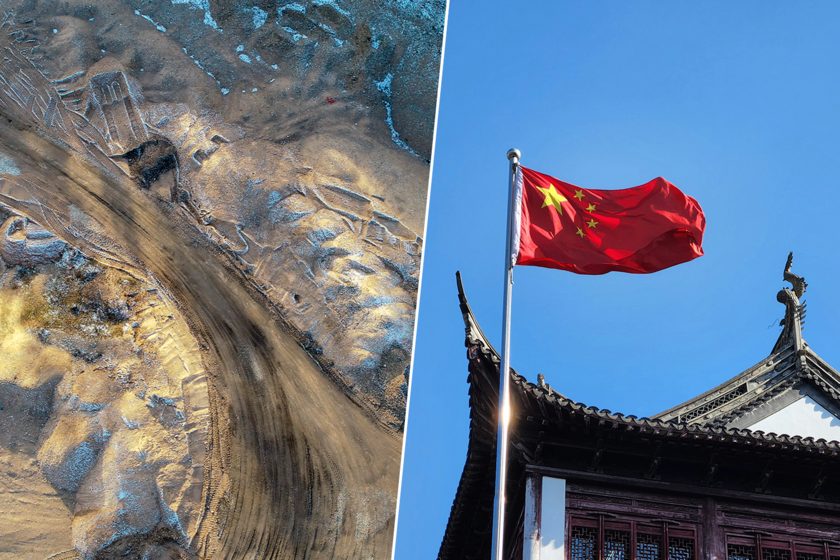China has been weaving, little by little, a network of power around critical minerals: first rare earths, then copper and now Germanio. Although its name barely says anything to the general public, this metal is essential for the defense industry – from the night vision systems of the fighters to the satellites – and for the optical fibers that support the Internet. Today there is almost no market, its Price has been quintupled in two years and the origin of the collapse has a clear name: Beijing.
The origin of the crisis. Two years ago, China announced controls at the exit of Germanio, Gallium and Antimony in response to the restrictions of the United States and the Netherlands on advanced semiconductors. However, the real blow arrived at the end of 2024: Germanio’s exports collapsed, leaving merchants without supply.
Terence Bell, from Strategic Metal Investments, acknowledged Financial Times that he had not been able to Buy a gram for six months. “The situation is desperate,” he said. Aaron Jerome, from Lipmann Walton & Co, described a devastated market: “Before we could buy 100 kilos; now we are lucky if we got 10, and the triple price.” And Christian Hell, from the Tradition Commercial House, added to the same medium that the demand was “for the clouds” and that he received desperate consultations of companies from the United States and Europe.
The figures confirm the collapse. According to an analysis of Silverado Policy Accelerator cited by Financial Times, between January and July of this year, Germanio imports to the United States from China fell 40%. The result has been an unprecedented price escalation: just $ 1,000 in 2023 to almost $ 5,000 in September this year. This is the highest level registered since 2011.
A strategic role. The importance of Germanio is not in its geological rarity, but that it is very difficult to extract, since it is obtained as a zinc and coal byproduct. In addition, its use in defense is irreplaceable for thermal image systems in fighters, drones and satellites.
In the civil sector, it is used in optical fiber, solar panels and chips. “Finding substitute materials is complicated, because it would imply a complete redesign and a loss of unacceptable precision in military applications,” explained the analyst Caroline Messecar in Financial Times.
For these reasons, according to estimates of the Fastmarkets agency, world demand is around 180-200 tons per year of Germanio.
One more piece of a much wider board. In Beijing they have converted critical minerals into geopolitical weapons. At the end of 2024, they prohibited the export of Gallium, Antimony and Germanio to the United States, and shortly after added Scandio and Disposio, essential in chips, telecommunications and storage.
The strategy behind the Asian giant is to monopolize the control of the entire chain. To name a few examples, China has 4% of the world copper reserves, but controls 49% of the global refining. “More than accumulating raw materials, China is building an intentional bottleneck in the supply chain,” my partner has detailed in WorldOfSoftware. The same goes for the Tungsten, where it controls 83% of the world supply and tightened the export controls in February 2025, which shot prices 55%.
In simple words: Beijing seeks to be essential. It controls the most valuable link – the defendant – and with it conditions global access to strategic metals of the 21st century. However, its power is not absolute: it depends on importing concentrates from countries such as Chile, Peru or Mexico. If any of those partners changes position – Mexico, for example, already imposed 50% tariffs on Chinese products in 2025 -, Beijing risks a cut of vital supplies. In addition, this control strategy has a price: Chinese copper foundations work with negative margins and some have had to close.
A movement to counterreloj. Before the blockade, Germanio’s great consumers try to move quickly. On the one hand, in the United States, defense giant Larkheed Martin signed in August a direct agreement with the South Korea Zinc to ensure supply, something unpublished so far. Lightpath Technologies, with government support, works in optical alternatives, although its director Sam Rubin warns in FT: “No one is going to redesign an existing system until it is inevitable.”
On the other hand, the options are scarce. Umicore in Belgium and Teck Resources in Canada produce some Germanio, but insufficient. Germany already warns that, if the crisis lasts, its automotive industry could stop part of the production in a matter of weeks. The European Chamber of Commerce has even asked Beijin to release supplies for chips factories.
The historical supplier, Russia, has also been out of the board. For years it was one of Germanio’s main sources for the West, thanks to its production associated with zinc and coal mining. However, international sanctions for the Ukraine War cut that flow almost completely. Moscow continues to produce, but its exports are now directed to China and countries that do not participate in the sanctions, according to FT. For the United States and Europe, that means having lost another supply route in the worst possible time, which has further reinforced Beijing’s domain.
Looking to the future. In Germany, a group of researchers from the Technical University of Freiberg works in a surprising method: extracting Germany from plants after fermentation processes for biogas. At the moment, they only achieve some milligrams per liter, but they aspire to reach a gram, which would open the door to a sustainable and local production.
From anonymity to key element. Germanio has become a symbol of a new era: that of minerals as strategic weapons. As Financial Times has pointed out, demand does not stop growing while the offer narrows. And the lesson is clear: in an electrified and militarized world, who controls critical minerals will control power.
Imagen | Freepik y unsplash
WorldOfSoftware | Nickel’s paradox: West needs it more than ever for electrification, but China and Indonesia have market dominance











